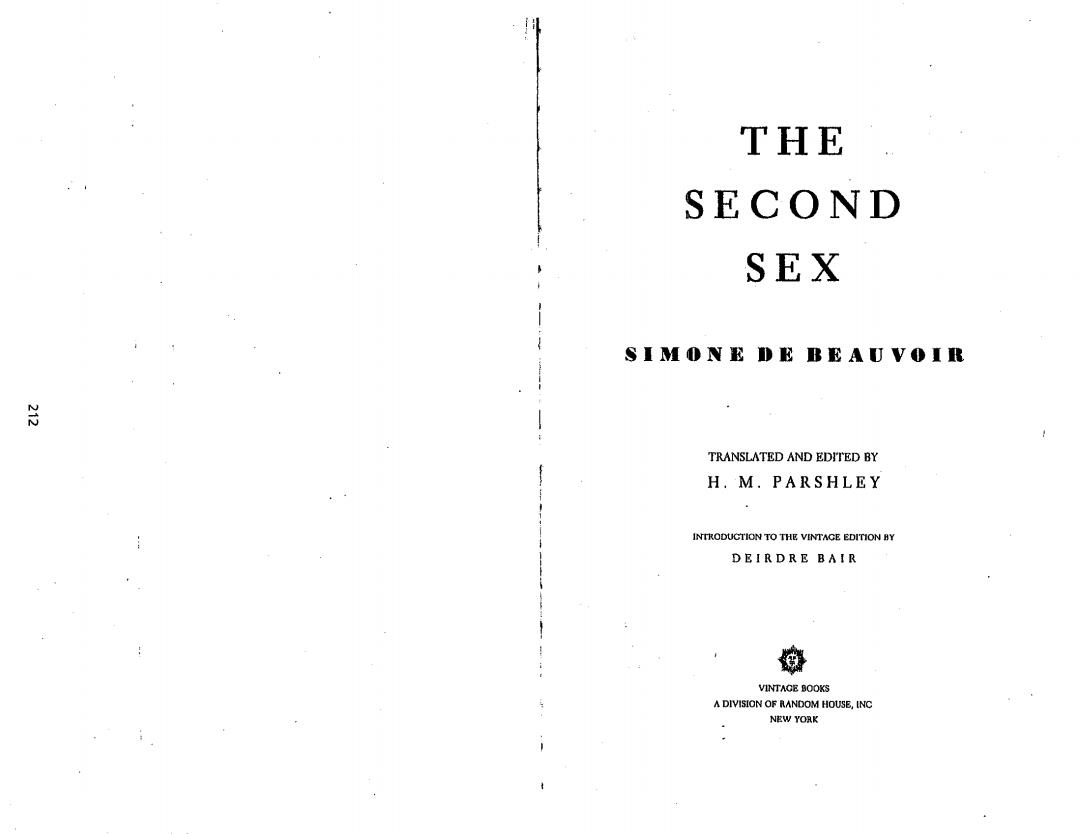
THE SECOND SEX SIMONE DE BEAUVOIR 为 TRANSLATED AND EDITED BY H.M.PARSHLEY INTRODUCTION TO THE VINTACE EDITION BY DEIRDRE BAIR 年 VINTACE BOOKS A DIVISION OF RANDOM HOUSE,INC NEW YORK
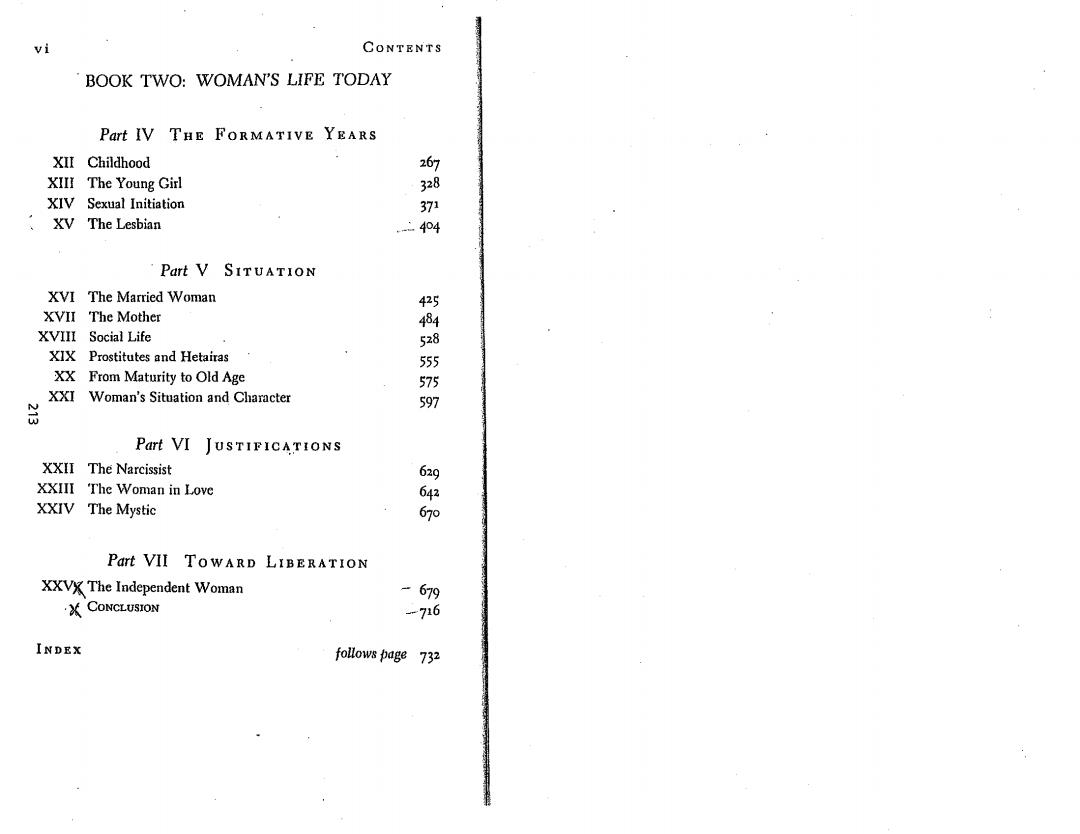
vi CONTENTS BOOK TWO:WOMAN'S LIFE TODAY Part IV THE FORMATIVE YEARS XII Childhood 267 XIII The Young Girl 328 XIV Sexual Initiation 371 XV The Lesbian .404 Part V SITUATION XVI The Married Woman 425 XVII The Mother XVIII Social Life XIX Prostitutes and Hetairas XX From Maturity to Old Age 575 XXI Woman's Situation and Character 台 597 Part VI JUSTIFICATIONS XXII The Narcissist 62g XXIII The Woman in Love 6 XXIV The Mystic 67p Part VII TOWARD LIBERATION XXVX The Independent Woman -679 XCONCLUSION -716 INDEX follows page 732
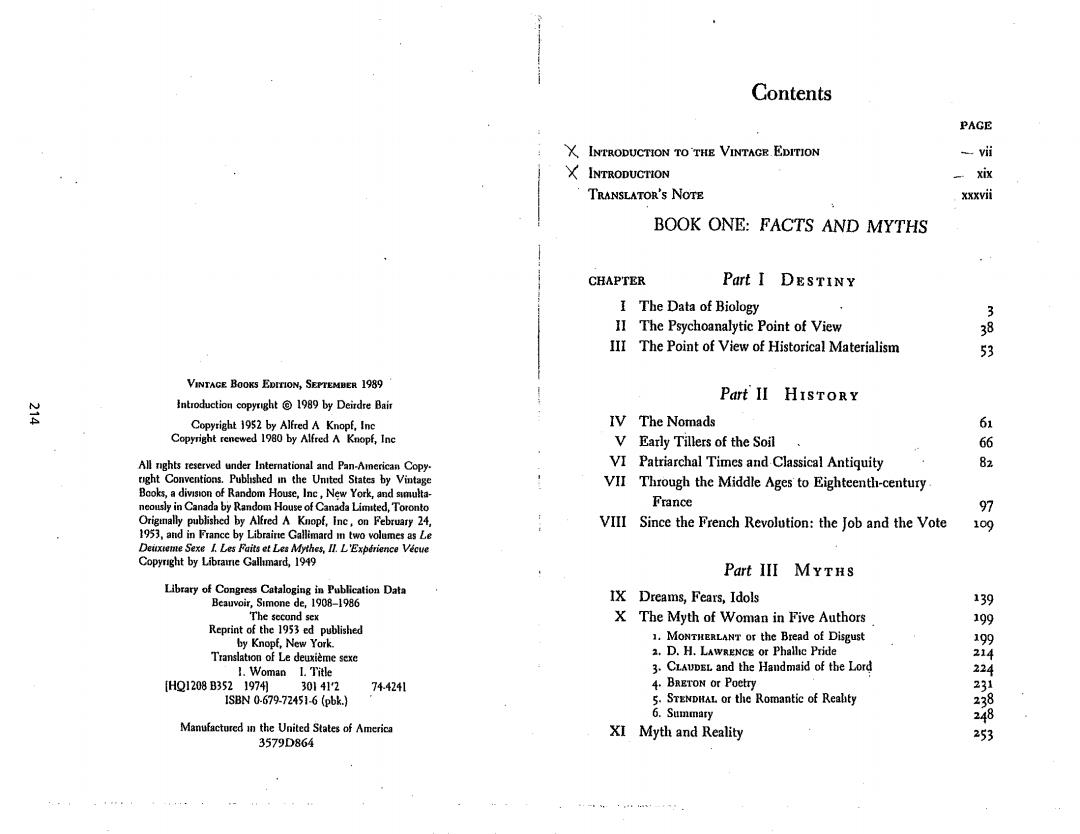
Contents PAGE X INTRODUCTION TO THE VINTAGE EDITION -vii X INTRODUCTION xix TRANSLATOR'S NOTE XXXVii BOOK ONE:FACTS AND MYTHS CHAPTER Part I DESTINY I The Data of Biology 3 II The Psychoanalytic Point of View 38 III The Point of View of Historical Materialism 53 VINTAGE BOOKS EDITION,SEPTEMBER 1989 Part II HISTORY 会 Introduction copyrght1989 by Deirdre Bair Copyright 1952 by Alfred A Knopf,Ine IV The Nomads 61 Copyright renewed 1980 by Alfred A Knopf,Inc V Early Tillers of the Soil 66 All nghts reserved under International and Pan-American Copy. VI Patriarchal Times and Classical Antiquity 82 rght Conventions.Published in the United States by Vintage VII Through the Middle Ages to Eighteenth-century Books,a division of Random House,Inc,New York,and smulta- neously in Canada by Random House of Canada Limited,Toronto France 97 Origmnally published by Alfred A Knopf,inc,on February 24. VIII Since the French Revolution:the Job and the Vote 109 1953,and in France by Librairte Gallimard i two volumes as Le Deixteme Sexe I.Les Faits et Les Mythes,I.L'Experience Vecue Copyright by Libraie Gallimard,1949 Part III MYTHs Library of Congress Cataloging in Publication Data Beauvoir,Simone de,1908-1986 IX Dreams,Fears,Idols 139 The second sex X The Myth of Woman in Five Authors 199 Reprint of the 1953 ed published by Knopf,New York. 1.MoNTHERLANT or the Bread of Disgust 199 Translation of Le deuxieme sexe 2.D.H.LAWRENCE or Phallic Pride 214 I.Woman I.Title 3.CLAUDSL and the Handmaid of the Lord 224 [HQ1208B35219749301412 744241 4.BRETON or Poetry 231 ISBN0-679-72451-6(pbk) 5.STENDHAL.or the Romantic of Reahty 6.Summary 238 248 Manufactured in the United States of America XI Myth and Reality 253 3579D864
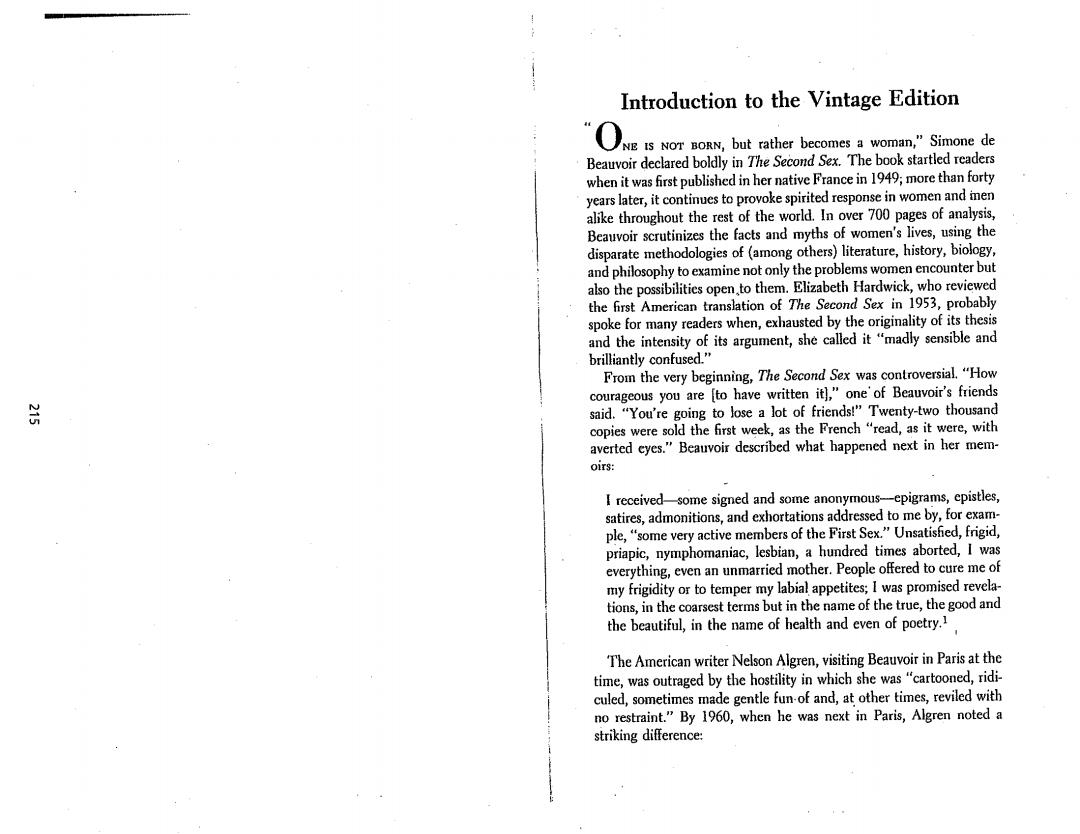
Introduction to the Vintage Edition Is NOT BORN,but rather becomesa woman,"Simone de Beauvoir declared boldly in The Second Sex.The book startled readers when it was first published in her native France in 1949;more than forty years later,it continues to provoke spirited response in women and inen alike throughout the rest of the world.In over 700 pages of analysis, Beauvoir scrutinizes the facts and myths of women's lives,using the disparate methodologies of(among others)literature,history,biology, and philosophy to examine not only the problems women encounter but also the possibilities open to them.Elizabeth Hardwick,who reviewed the first American translation of The Second Sex in 1953,probably spoke for many readers when,exhausted by the originality of its thesis and the intensity of its argument,she called it"madly sensible and brilliantly confused” From the very beginning,The Second Sex was controversial."How courageous you are [to have written it],"one'of Beauvoir's friends 兰 said."You're going to lose a lot of friends!"Twenty-two thousand copies were sold the first week,as the French "read,as it were,with averted cyes."Beauvoir described what happened next in her mem- oirs: I received-some signed and some anonymous-epigrams,epistles, satires,admonitions,and exhortations addressed to me by,for exam- ple,"some very active members of the First Sex."Unsatisfied,frigid, priapic,nymphomaniac,lesbian,a hundred times aborted,I was everything,even an unmarried mother.People offered to cure me of my frigidity or to temper my labial appetites;I was promised revela- tions,in the coarsest terms but in the name of the true,the good and the beautiful,in the name of health and even of poetry.1 The American writer Nelson Algren,visiting Beauvoir in Paris at the time,was outraged by the hostility in which she was"cartooned,ridi- culed,sometimes made gentle fun-of and,at other times,reviled with no restraint."By 1960,when he was next in Paris,Algren noted a striking difference:
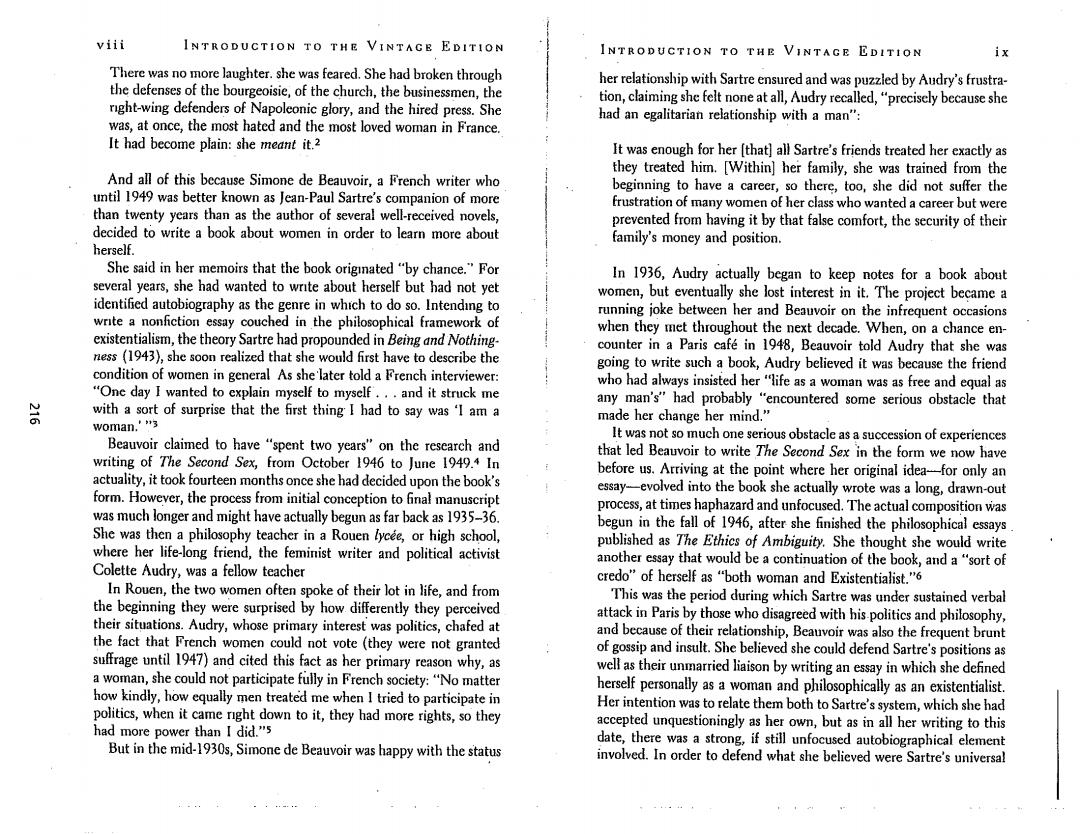
viii INTRODUCTION TO THE VINTAGE EDITION INTRODUCTION TO THE VINTAGE EDITION ix There was no more laughter.she was feared.She had broken through her relationship with Sartre ensured and was puzzled by Audry's frustra- the defenses of the bourgeoisie,of the church,the businessmen,the rght-wing defenders of Napoleonic glory,and the hired press.She tion,claiming she felt none at all,Audry recalled,"precisely because she had an egalitarian relationship with a man": was,at once,the most hated and the most loved woman in France. It had become plain:she meant it.2 It was enough for her (that]all Sartre's friends treated her exactly as they treated him.[Within]her family,she was trained from the And all of this because Simone de Beauvoir,a French writer who beginning to have a career,so there,too,she did not suffer the until 1949 was better known as Jean-Paul Sartre's companion of more frustration of many women of her class who wanted a career but were than twenty years than as the author of several well-received novels, prevented from having it by that false comfort,the security of their decided to write a book about women in order to learn more about family's money and position. herself. She said in her memoirs that the book originated "by chance."For In 1936,Audry actually began to keep notes for a book about several years,she had wanted to write about herself but had not yet women,but eventually she lost interest in it.The project became a identified autobiography as the genre in which to do so.Intending to running joke between her and Beauvoir on the infrequent occasions write a nonfiction essay couched in the philosophical framework of when they met throughout the next decade.When,on a chance en- existentialism,the theory Sartre had propounded in Being and Nothing- counter in a Paris cafe in 1948,Beauvoir told Audry that she was ness (1943),she soon realized that she would first have to describe the going to write such a book,Audry believed it was because the friend condition of women in general As she'later told a French interviewer: "One day I wanted to explain myself to myself...and it struck me who had always insisted her"life as a woman was as free and equal as with a sort of surprise that the first thing I had to say was'I am a any man's"had probably "encountered some serious obstacle that woman.'"3 made her change her mind." Beauvoir claimed to have"spent two years"on the research and It was not so much one serious obstacle as a succession of experiences writing of The Second Sex,from October 1946 to June 1949.4 In that led Beauvoir to write The Second Sex in the form we now have actuality,it took fourteen months once she had decided upon the book's before us.Arriving at the point where her original idea-for only an form.However,the process from initial conception to final manuscript essay-evolved into the book she actually wrote was a long,drawn-out process,at times haphazard and unfocused.The actual composition was was much longer and might have actually begun as far back as 1935-36 begun in the fall of 1946,after she finished the philosophical essays She was then a philosophy teacher in a Rouen lycee,or high school, where her life-long friend,the feminist writer and political activist published as The Ethics of Ambiguity.She thought she would write another essay that would be a continuation of the book,and a"sort of Colette Audry,was a fellow teacher credo"of herself as "both woman and Existentialist."6 In Rouen,the two women often spoke of their lot in life,and from the beginning they were surprised by how differently they perceived This was the period during which Sartre was under sustained verbal their situations.Audry,whose primary interest was politics,chafed at attack in Paris by those who disagreed with his-politics and philosophy, the fact that French women could not vote (they were not granted and because of their relationship,Beauvoir was also the frequent brunt of gossip and insult.She believed she could defend Sartre's positions as suffrage until 1947)and cited this fact as her primary reason why,as a woman,she could not participate fully in French society:"No matter well as their unmarried liaison by writing an essay in which she defined herself personally as a woman and philosophically as an existentialist. how kindly,how equally men treated me when I tried to participate in politics,when it came right down to it,they had more rights,so they Her intention was to relate them both to Sartre's system,which she had had more power than I did."5 accepted unquestioningly as her own,but as in all her writing to this But in the mid-1930s,Simone de Beauvoir was happy with the status date,there was a strong,if still unfocused autobiographical element involved.In order to defend what she believed were Sartre's universal